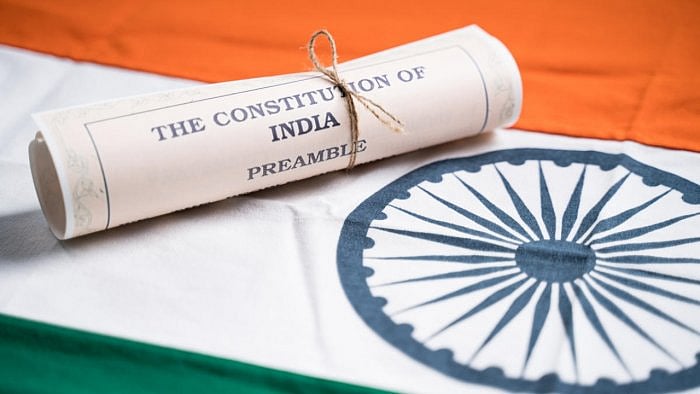
The new chapter in the Constitution would include issues related to 'simultaneous election', 'sustainability of simultaneous elections' and 'common electoral roll' for Lok Sabha, state legislative assemblies, panchayats and municipalities so that the three-tier simultaneous polls could be held together 'in one go', they explained.
Credit: iStock Photo
Charan Mahananda
B R Ambedkar concluded his last address to the constituent assembly on November 25, 1949, with a warning: “How long shall we go on denying equality in our social and economic life?” His apprehension remains agonisingly relevant 76 years later. Constitution Day cannot be about normatively celebrating a document-- yet another ritual in our political rhetoric. Instead, it should serve as a moral provocation, a reminder that we still have work to do; equality, liberty, and fraternity are still dreams to many Indians.
India came to realise the Constitution of India. It was the dreams of Dalit communities against untouchability, women who demanded electoral rights, workers who wanted to be treated with dignity, and religious minorities anxious about their place in a Hindu-majority nation. Their document was revolutionary: it abolished untouchability (Article 17), prohibited discrimination based on caste, religion, or gender (Article 15), and gave Universal Adult Franchise. It was well described by constitutional scholar Granville Austin as “first and foremost a social document.”
But a troubling paradox persists. While constitutional values fill our national discourse, our day-to-day practices often betray them. Recent debates on citizenship question who belongs on the basis of religion – a direct challenge to the promise of equality under Article 14. Journalists and activists face prosecution under laws such as the Unlawful Activities (Prevention) Act, constraining Article 19’s guarantee of free speech difficult. Affirmative action, a tool to correct historical injustice, is treated not as a constitutional necessity but as a subject for political debate. These tensions disclose a deeper crisis: India’s constitutional ideals are no longer compatible with majoritarianism and entrenched social inequalities.
How do we cultivate constitutional patriotism— a sense of national belonging grounded in values rather than tribes or religion? Neither laws nor rhetoric can achieve this; it entails a change in our hearts and intent. Constitutional patriotism, unlike nationalist or religious patriotism, obligates us to deliver a brand of democratic citizenship that is reflected in our everyday conduct.
Consider an example. A residents’ association contemplates whether to allow street vendors near its gate. Objections usually involve concerns about security and cleanliness. But democratic citizenship, driven by constitutional values, would prompt the association to equally consider the vendors’ right to livelihood under Article 21. While recognising residents’ concerns about safety, one cannot undermine another human’s right to earn a living. It is in such quiet, everyday choices --in workplaces and neighbourhoods-- that the spirit of our progressive Constitution shines.
We speak often of liberty. Equality is a topic of conversation. But fraternity — the constitutional principle most essential and least practised — is largely forgotten.
Fraternity was deliberately placed last in the Preamble by Ambedkar. Why? Without it, freedom becomes selfish, and liberty and equality risk becoming hollow promises on paper. Fraternity is the value we need the most, yet practise the least.
It is critical to recognise that fraternity is not mere tolerance, nor is it simply upholding diversity. It is the elusive everyday solidarity that recognises equal moral worth and rejects hierarchy. Why do we have such big celebrations of Diwali in our apartment blocks while Eid quietly sneaks by? If the normalisation and silence around these quiet omissions do not worry us, then it signals that we are far away from brotherhood. This is because fraternity demands challenge and resistance from us in the face of these omissions disguised as convenient norms.
These are embarrassing situations, as we give in to what is convenient instead of what is right. However, such moments and choices make or break our constitutional values.
Constitutional theorist Upendra Baxi reminds us that the Constitution is an unfinished business, permanently. Each generation must renew its commitment to constitutional principles and reinterpret them in the face of new challenges. This means moving beyond empty rhetoric and meaningless celebrations towards the more tedious efforts of being guided by constitutional values in our workplaces, neighbourhoods, and own homes.
The significance of Constitution Day is not that the Constitution protects us, but that we protect the Constitution, not simply against formal amendments, but against the whole erosion of the spirit of the Constitution by a system of normalised exclusion and indifference in practices.
The Constitution was the choice of enlightenment in India: equality, even human dignity, rather than heredity. It is not the power of repetition of its provisions but the willingness to be inconvenienced by its demands. To venerate it, we must do the kind of work that upholds a constitutional life, and not just a ritual reading of the Preamble.
Ambedkar realised that without social change, there would be no such thing as legal equality. He even issues an emergency precaution in that there is no democracy in the book of the Constitution as such, but the spirit of democracy is kept alive by simple acts of daily justice and bravery.
Our Constitution is seventy-six years old. We are challenged by a rather simple question: “Are we brave enough to bring the work that our founders began in our homes, our workplaces, and our neighbourhoods to the finish?”
(The writer is with the Institute of Public Health Bengaluru and has been an Urban Fellow at the Indian Institute of Human Settlements)
Disclaimer: The views expressed above are the author's own. They do not necessarily reflect the views of DH.